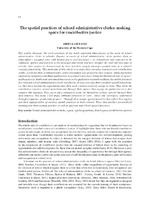The spatial practices of school administrative clerks: making space for contributive justice
Abstract
The article aims to contribute to our analysis of social justice by suggesting that we broaden our focus on
social justice to include issues of contributive justice. It highlights how those who are denied contributive
justice do not simply lie down and accept their fate but that they actively counter the contributive injustice
visited upon them. Contributive injustice is where workers’ opportunities for self-development, gaining
self-esteem and recognition by others is thwarted by the unequal division of labour that assigns them
simple, mindless, and routine tasks (Gomberg, 2007; Sayer, 2009, 2011). I agree with the assertion
by the proponents of contributive justice that the unequal division of labour leads to the curtailing of
opportunities for self-development for those who are denied complex work (Sayer, 2011). However, I posit
that administrative clerks do not passively accept this inequality of opportunity but through their agency,
reflexivity and tactics, carve out spatial practices of self-development and, in the process, gain self-esteem
and recognition at school level.
Literature on the practice of school administrative clerks in South Africa is sparse (Van der Linde,
1998; Naicker, Combrinck & Bayat, 2011). These clerks suffer inequalities of opportunity because of
the division of labour which relegates them to a role that offers low remuneration, little recognition and
limited participation. Studies of the roles of administrative clerks in schools (Casanova, 1991; Van Der
Linde, 1998; Thomson, Ellison, Byrom & Bulman, 2007; Conley, Gould & Levine, 2010; Naicker,
Combrinck & Bayat, 2011), higher education institutions (Szekeres, 2004; Mcinnis, 2006; Whitchurch &
London, 2004) and businesses (Fearfull, 1996, 2005; Truss, 1993) found that they are regarded as marginal
and invisible even though their contributions are essential for the smooth running of their workplaces.

